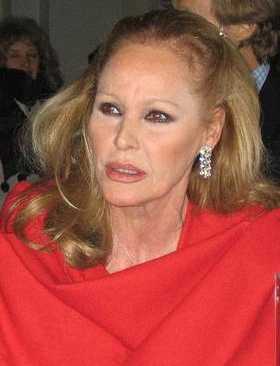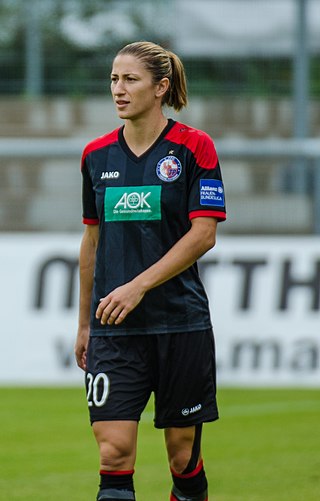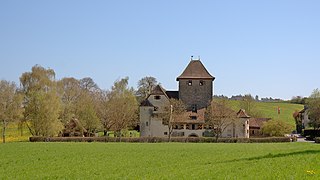
Rungholt was a settlement in North Frisia, in what was then the Danish Duchy of Schleswig. The area today lies in Germany. Rungholt reportedly sank beneath the waves of the North Sea when a storm tide hit the coast on 15 or 16 January 1362.

Ursula Kroeber Le Guin was an American author best known for her works of speculative fiction, including science fiction works set in her Hainish universe, and the Earthsea fantasy series. She was first published in 1959, and her literary career spanned nearly sixty years, producing more than twenty novels and over a hundred short stories, in addition to poetry, literary criticism, translations, and children's books. Frequently described as an author of science fiction, Le Guin has also been called a "major voice in American Letters". Le Guin said she would prefer to be known as an "American novelist".

Ursula Andress is a Swiss actress, former model and sex symbol who has appeared in American, British and Italian films. Her breakthrough role was as Bond girl Honey Ryder in the first James Bond film, Dr. No (1962). She later starred as Vesper Lynd in the 1967 Bond parody Casino Royale. Other credits include Fun in Acapulco (1963), 4 for Texas (1963), She (1965), The 10th Victim (1965), The Blue Max (1966), The Southern Star (1969), Perfect Friday (1970), Red Sun (1971), The Sensuous Nurse (1975), Slave of the Cannibal God (1978), The Fifth Musketeer (1979), Clash of the Titans (1981), and Peter the Great (1986).
Ursula Hegi is a German-born American writer. She is currently an instructor in the MFA program at Stony Brook Southampton.

Ursula Gertrud von der Leyen is a German physician and politician serving as the 13th president of the European Commission since 2019. She served in the German federal government between 2005 and 2019, holding successive positions in Angela Merkel's cabinet, most recently as federal minister of defence. Von der Leyen is a member of the centre-right Christian Democratic Union (CDU) and its EU affiliated group, the European People's Party (EPP).

Stones from the River is the third-person omniscient 1994 novel by Ursula Hegi which chronicles 40 years of the life of Trudi, a woman with dwarfism, as she navigates the silently complicit, violent, and redemptive era of World War I and II Germany in the fictional town of Burgdorf.

St. Ursula Academy, located in the East Walnut Hills neighborhood of Cincinnati, Ohio, is a Catholic college-preparatory high school for young women that offers an intensive four-year program in the fields of English, mathematics, science, social studies, French, Spanish, Latin, and religion. An entrance test is required of all prospective freshmen students. Academic scholarships are also based on the results of this test. The school's Educational Services Program (ESP) assists girls with learning disabilities.
Hawthorne Books is an independent publisher founded in 2001 in Portland, Oregon, U.S., specializing in literary fiction and creative nonfiction original trade paperbacks.

Bianca Ursula Schmidt is a German footballer. She plays as a defender for Turbine Potsdam and the German national team.

Ursula Hope McConnel (1888–1957) was a Queensland anthropologist and ethnographer best remembered for her work with, and the records she made of, the Wik Mungkan people of Cape York Peninsula.

Ursula is a feminine given name in several languages. The name is derived from a diminutive of the Latin ursa, which means "bear". The name has been rather uncommon in the English-speaking world, although its use has been influenced since the twentieth century by the Swiss-born actress Ursula Andress.
Poseidon Press was an imprint of Simon & Schuster publishing, operating from 1982 to 1993. The founding editor was Ann Patty, who later went on to become an executive editor at Harcourt. The imprint was best known for discovering interesting new literary voices, and launched the careers of many now-famous writers.
Ursula Miriam Dronke was an English medievalist and former Vigfússon Reader in Old Norse at the University of Oxford and an Emeritus Fellow of Linacre College. She also taught at the University of Munich and in the Faculty of Modern and Medieval Languages at Cambridge University.

Hegi Castle is a castle in the city of Winterthur of the canton of Zurich in Switzerland. It is a Swiss heritage site of national significance.

The Execution of Justice is a 1985 novel by the Swiss writer Friedrich Dürrenmatt. It tells the story of an attorney who is tasked to reinvestigate a man sentenced for murder. The book criticises elements of the legal system and ponders on the nature of justice. It was adapted into the 1993 film Justice, directed by Hans W. Geißendörfer.

Ursula Lehr née Leipold was a German academic, age researcher and politician. She was the first professor of gerontology in Germany, with a chair at the University of Heidelberg from 1986. She served as federal minister of youth, family, women and health from 1988 to 1991. She was a member of the Bundestag from 1990 to 1994. Returning to science, she founded the German centre for research on aging (DZFA) of the University of Heidelberg in 1995, and was head of the German National Association of Senior Citizens' Organizations (BAGSO) from 2009 to 2015.
Oliver Nicola Hegi is a Swiss male artistic gymnast and a member of the national team. He participated at the 2015 World Artistic Gymnastics Championships in Glasgow, and qualified for the 2016 Summer Olympics.
Ursula Fischer is a German former national politician (PDS).

Ruth Jacobsen was a German-born lesbian artist and a Hidden Child of the Holocaust. During the Second World War, she fled with her parents to the Netherlands where she was hidden by the Dutch resistance until she was reunited with her parents towards the end of the war. Traumatized by the war, her parents both committed suicide. In 1953, she emigrated to the United States to stay with distant family and there became a textiles designer. Working as the first female film projectionist in New York, she helped create a training program for women entering that profession. Jacobsen increasingly devoted her time to art using family letters and photographs in order to cope with her childhood traumas. She is remembered in particular for her collage works centred on the Holocaust.












